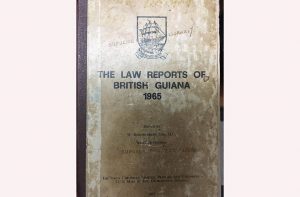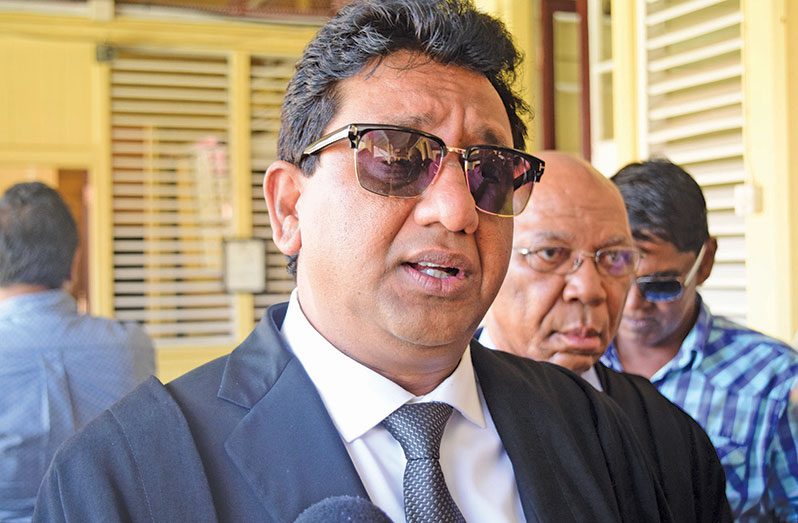-reports up to 2020 to be compiled, GBA lauds initiative
Attorney General and Minister of Legal Affairs, Anil Nandlall, S.C. says he will resume the printing and publishing of the local law reports, better known as the Guyana Law Reports – an indispensable tool for judges, lawyers, students and even academics.
The latest volume is that of the year 2007. Under Guyana’s ‘common law’ legal system, court decisions are heavily reliant on prior judicial pronouncements. The doctrine of precedent, or ‘stare decisis,’ mandates that courts lower in the hierarchy are bound by the previous decisions, or precedents, of the courts above them, when the facts of the cases are sufficiently similar.
The ‘ratio decidendi’ or ‘reason for deciding’ forms the binding precedent of a judge’s decision, for future judges to follow. The operation of ‘binding precedent’ is reliant upon the existence of extensive law reporting, where, as Nandlall explained, the nation’s top judicial decisions are documented into volumes or ‘law reports.’

During an interview with the Guyana Chronicle, the Attorney General explained that law reporting is a “very important part of the legal architecture of any country,” noting that if there is no “proper law-reporting system” it hinders development of the country’s jurisprudence and stymies judges, lawyers and even law students in their academic, research and other pursuits.
Vice-President of the Guyana Bar Association (GBA) and attorney-at-law, Teni Housty, expressed similar sentiments as he described the decision to print the editions as an “extremely good move” and one that is “long overdue.”

Housty, during a telephone interview with this newspaper on Sunday, explained that as a result of Guyana’s legal system being built upon precedents, law reporting — which will mandate judges to write thorough and comprehensive judgments — coupled with Guyana’s Time Limit For Judicial Decisions Act 2009, will “add to the strength and policy of the jurisprudence that will emerge from Guyana.”
“As judges write, we are aware of what is being decided and there is an opportunity for consistency and predictability in the decision-making framework,” Housty explained.
The lawyer highlighted that the benefits of law reports are acknowledged by the GBA to the extent where there is a designated area on the website to access a list of judicial decisions.
“If you look at the judiciaries from other countries, the richness of the law is captured in the decisions,” Housty said, using Guyana’s regional counterparts, Trinidad and Tobago and Jamaica to make a comparison.
“When you want to understand the richness of Guyana’s jurisprudence, all you have to do is go pick up an old law book; a lot of things people are fighting over now were decided long ago,” Housty explained, noting that because of the lack of law reporting, those written judgments are unavailable.
While some cases arising out of Guyana may have made their way to the West Indian Law Reports, the Commonwealth Law Reports and other reports available in print and through legal resource databases such as LexisNexis and WestLaw, Housty explained these judgments are usually where important issues of law are being debated and they are selectively documented at the discretion of editors.
Housty highlighted that with the ‘new rules’ of the courts, lawyers are tasked with writing thorough submissions, which, in turn, result in some judges writing exceptional judgments. He described the Chief Justice (ag) Roxane George, C.C.H, S.C., as a “writing machine,” whether or not lawyers like her decisions.
“There are no visible drawbacks for law reports, the entire legal system, the entire administration of justice will benefit,” Housty said, as he highlighted the importance of law reports.
He urged judges to continue writing and recommended that even with time constraints, they should aim to write even more. The attorney-at-law said the resumption of the publishing of the local reports is not timely, but is “overdue.”
He highlighted that the situation is such in some cases that when lawyers are conducting research on some issues, they must rely on the “comradery”[sic] of their peers.
When he was Attorney General under the Ramotar administration, Nandlall had taken up the mantle from his predecessor Charles Ramson Snr. to update the Guyana Law Reports in print up to the year 2007, and make accessible online the complete set of reports from 1930 to 2007, which he completed in 2013.
Those 200 sets of 14 volumes published in 2013 built upon the previous undertaking to publish the Guyana Law Reports which was done in 1996 under the auspices of Lions Rotary International to print the reports of 1976.
The Attorney General explained that the gigantic undertaking to accumulate all the Guyanese High Court and Appellate Courts decisions from 2007 to 2020 is an expensive and time-consuming exercise, but he understands the importance of the exercise and must “get the work done.”
He disclosed that he will be receiving the assistance of Professor Velma Newton from the University of the West Indies at Cave Hill, Barbados, who is also the Regional Director of the Canadian-funded IMPACT Justice Project aimed at improving access to justice in the Caribbean.



.jpg)









